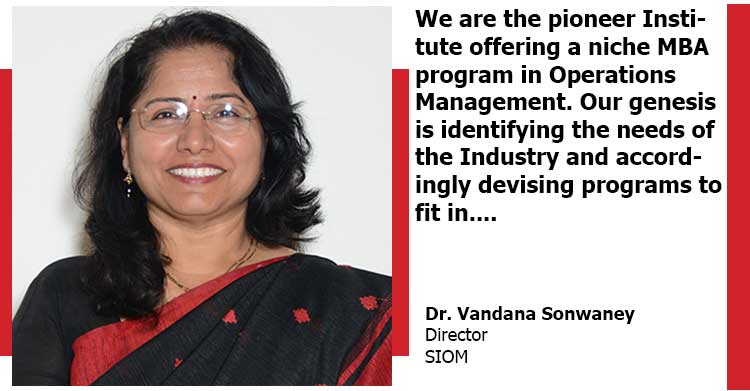An Interview with Dr. Vandana Sonwaney | Director | SIOM

Q1. SIOM is India’s only institute dedicated to Operations Management, constituted with a vision of Empowering and leading Operations Excellence. How far has SIOM grown as a centre of excellence in different aspects of management education from its establishment?
We are the pioneer Institute offering a niche MBA program in Operations Management. The flagship program MBA in Operations was conceptualized to fill in the void of operations professionals to focus on the processes efficiencies and improvements tackling the key performance areas of any Business. The thrust and focus on operational efficiencies in the curriculum, incorporating technological advances with hands-on learning to tackle real-time Industry problems through live projects, Project-based learning, and Six Sigma projects makes SIOM the preferred destination for corporates to source their talent in this niche domain. With an acclaimed presence in the field of operations since 2005, we observed the Agriculture sector was drastically changing with technological and advanced processes. The dearth of professionals who could bridge farming and Agriculture with post-harvest business operations was urgently felt. This gave way to another promising program MBA in Agribusiness Operations.
Our genesis is identifying the needs of the Industry and accordingly devising programs to fit in. This is one reason why companies come to us not only for recruitment but also for customized certification programs, MDPs, and need-based Training Programs. The continuous quest to be Industry-relevant and contribute to the field of Operations, Supply chain and Logistics by way of research, academics, consultancy, and advisory services for the corporate makes SIOM the place to go for anything related to operations.
SIOM has evolved into an Operations excellence Hub!
Q2. Although, SIOM has received many awards i.e. Excellence Award for Innovative, Modern and Industry-related Curriculum, B School award for Industry-related curriculum in Operations etc. Do you think the curriculum is still lacking in providing the students to make them fit for the Corporate?
The last decade has been about a lot of disruptions for the economies around the world. Technological, Environmental, Social, and in terms of Business models too. This dynamism fuels the agility and the need to reciprocate to these changes and thus the quest to adapt to them continuously.
Q3. Industry has suggestions that universities need to work their part with the students to make them employable. What is your advice to the Industry experts or HR Leaders for developing Campus hiring strategies?
For a niche institute like us, we’re intentionally proactive in terms of working towards the employability of our students. The majority of students are laterals with experience in the field of operations or with the interest of making a career in this field. The first filtering happens when the students make their choice of graduating with us. We have a very strategically interwoven Industry academia interface system. One piece of advice to the HR leaders is to engage with us beyond recruitment. Right from the admissions panels to keynote speakers for various events, Jury members for competitions, Live projects, Summer Internships, Six Sigma projects, Guest lectures, Visiting and adjunct faculty roles, Industry representation on the Board of studies panel and Quality control cell,
TED Speakers, and last but not the least recruitment, this is the plethora of Industry engagement platforms. These engagements will help us at both ends, to gauge, discuss, update, and curate the curriculum and activities to make them industry-ready and employable. With the flexibility vested upon us as an autonomous constituent unit of the University, the past several years of Industry dynamism have been well adapted, in terms of inputs through specially launched subjects like Machine Learning and Digital Twins, Smart Manufacturing, or Circular Design Thinking or specially designed project-based learning for students to get hands-on experience on real-time business issues.
Q4. India has the world’s largest higher education system in terms of number of education institutions, but its presence in the international education system has been abysmally below its true potential. Share your views on how the Internationalization of higher education can be a game changer for India.
For Indians, education is a goalpost aligned with several other life goals but in foreign countries, education is a learning process. The curriculum is more liberal and interdisciplinary as compared to the Indian Education system. Probably that is where we need to tweak our education systems. It would be a misnomer for me to say we need to completely overhaul our education systems. Discipline, perseverance, and the capacity to take the load are inherent traits specific to Indians and we have several examples of Indians driving innovation abroad and heading the top multinationals. Yes, the accessibility to the environment for innovation and resources varies with the varied approaches of educational institutes in India. Hence if the appropriate environment and conducive ecosystem are made available it would be an equitable platform and would certainly make a huge difference. That is exactly what the ambitious NEP is intended for. I would like to quote’ Prof. Nirmalya Kumar here ‘The need is to improve the education system of the country to be able to utilize the innovative minds of the budding youth population and expand their creative thinking. This is lacking in the Indian education system’.
Q5. Any suggestions you would like to give to the current youth and the aspiring students?
Make informed decisions! Believe in yourself! Dare to dream big!


